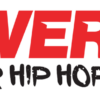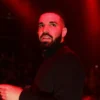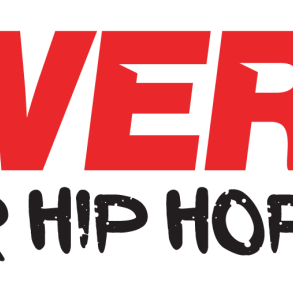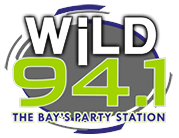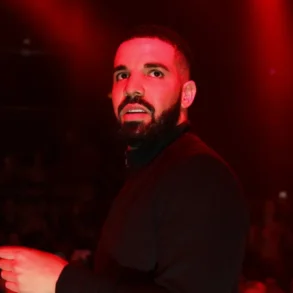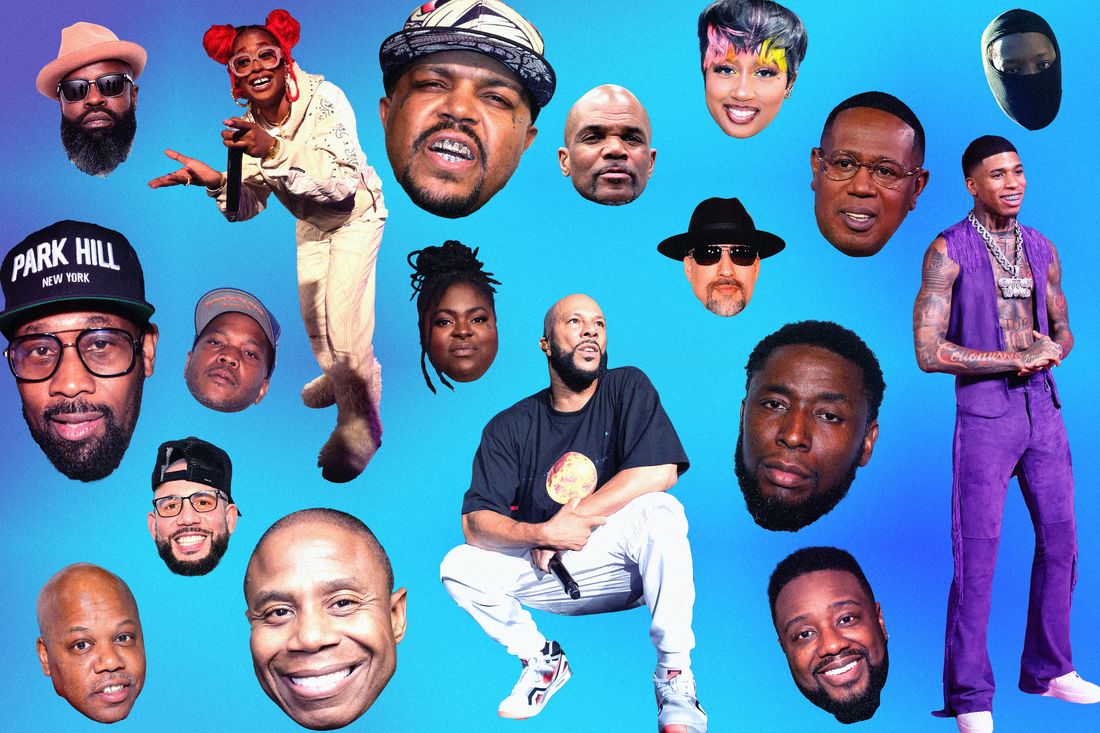
Photo-Illustration: Vulture; Photos: Backwoodz Studioz, Getty
Hip-hop was always rooted in the party: a place to enjoy good vibes, to embrace the moment, to celebrate despite troubles that aren’t going anywhere. The 50th birthday of the genre has been all of that in spades: plenty of reason to party, with even more problems to face once the speakers turn down and the lights turn on. Much of this year’s anniversary festivities have been met with understandable cynicism as a result. Following years of sporadic corporate investment in the culture, some major companies have clumsily attempted “hip-hop 50” projects, and people who dismissed the genre or are decades removed from knowing it are being tasked with gatekeeping its record books and delivering tired eulogies. Still, hip-hop has had a chance to shine elsewhere. Pioneers like the Cold Crush Brothers and Roxanne Shante are getting their due; era-spanning performances including the Grammys’ tribute curated by Questlove and DJ Cassidy’s Pass The Mic Live! show at Radio City are showcasing the breadth of sonic, stylistic, and thematic excellence within the genre; and there are important conversations being held in live panels and editorials about rap’s obsessions with misogyny, transphobia, and death.
All told, hip-hop 50 has been a welcome moment of retrospection. Everyone who loves hip-hop has an origin story — that lightning-in-a-bottle moment when you hear a lyric, see a performance, recognize a sample flip, or write your own rhyme and realize that, whatever it is that you just discovered, you are willing to do whatever it takes to make it happen again. B-Real of Cypress Hill recalls listening to Run-D.M.C. on an AM radio station in Los Angeles, Chika remembers hearing Outkast at a roller rink on a youth-group trip, and Doug E. Fresh still thinks about his sister coming home to excitedly share something she heard at school. Not all hip-hop love stories stem from joy, though: Navy Blue first embraced the music at his brother’s funeral. Pain and euphoria are equal catalysts for creative brilliance.
Each of the stories below comes from people who didn’t just fall in love with the culture, they turned their curiosity into a profession — paying it forward by making art that led future fans to connect with the genre. Hip-hop has never been a monolith, but if there was ever one thread connecting it all, it’s that it has made us feel seen, or made us see something we never had before.
I think I was 11. I was in Cincinnati visiting my cousin. They started playing “Sucker M.C.’s” and “Rock Box” by Run-D.M.C. I remember feeling a feeling I hadn’t felt before. The music was new, fresh, but a part of me already, like, man, this is me. I was already listening to “The Message,” Grandmaster Flash and Melle Mel with the Furious Five. Somebody had bought me that record. But hearing “Sucker M.C.’s” and “Rock Box” took me to a place where I was like, I really love this.
Run-D.M.C. had this thing about ’em that expressed Black pride. It felt like they was superheroes, but relatable. I literally had those Adidas sweatsuits that they wore on Krush Groove. They had a style that was fresh and cool, and they had a confidence that, as a young Black boy, I needed to be reminded of and see reflected. They were like a younger Muhammad Ali for me but in a musical way. The way they rapped, how much they was bragging about themselves, all of it exuded Black confidence and power. They represented a revolution in hip-hop, and in music, and in Black and brown America. It was something that I needed, something that I desired.
In ’84, I wrote my first rap — I was with my cousin again in Cincinnati — and all the homies, they started saying it. They recognized it as being dope. I loved that feeling, like I was having my own Muhammad Ali–type moment. But I also liked the way they felt joy and felt empowered by it. I wasn’t using the word “empowered” then, but that’s what it was. It kind of defined for me what I loved about being an MC. I could get my own shit off, but I also could affect others and charge them up to feel their power and be great.
It feels like describing a scene from a movie. It was 2002, and my brother and I were playing NBA Live 2003 on GameCube, the one with Jason Kidd on the cover. My older brother had a five-disc CD changer that he got for Christmas the year prior and all of our music was on burned discs. I remember the moment hearing “Notorious Thugs” for the first time. It was track 12 on this CD we took from our stepdad. That song spoke to me in a way I wasn’t even aware that music could talk. I’m sure I lost the game we were playing by a bunch of points. It didn’t matter. I was much more concentrated on the fact that I had never heard music sound like this before. Like they were singing, rapping, yelling, chanting. It was the cadences that caught my attention at first. They were rapping in patterns no one else could even attempt. I was immediately drawn to it. I put it on repeat for the rest of the night and probably the next few years.
I had already loved the idea of creating music. My uncle was producing hip-hop, my father was producing and singing R&B, my grandfather was playing guitar, and my grandmother was singing in his band. Creating music felt like a cross of art and science classes, which were my two favorites growing up. But it wasn’t until playing a video game listening to Bone Thugs and Biggie that it all clicked for me. I decided right then and there that I would rap.
I fell in love with hip-hop at the age of 7 or 8, which would have been a year or so before I started trying to write songs. We got our hip-hop radio from New York. It never came in super-clearly and you had to play with the antenna and move your receiver around just to get a glimpse of what was taking place. But when you got those glimpses, it was super-compelling. It felt like it was coming from another planet. Being immersed in this new medium felt so otherworldly and drastically different from everything else that was taking place.
Long before I was familiar with rap records and the Run-D.M.C.s or Kurtis Blows and Afrika Bambaataas of the world, hip-hop was this emerging culture evolving in cities around the country. A lot more of the culture at that time was underground — there were only two or three groundbreaking artists who were “mainstream.” I was inspired by neighborhood heroes, legendary Philadelphia DJs, and local MCs and what they would do to keep the party going. Hip-hop came to be during the disco and funk era — the more adult-feeling mediums. I just turned so DJ Kool Herc’s party in the Bronx took place a couple of months before I was born. We’ve evolved and we’ve aged gracefully together.
I remember the time period, more so than a day. I fell in love with it because I knew it was the art for the unspoken. I remember hearing “The Message” and how it painted a picture and rhythm. I remember watching Beat Street and knowing that that was the life for me. I just remember how the music made me feel. Hip-hop would end up as a way of life — the way I walk, talk, eat, sleep, dress, act, react to things. I’m from the south side of Yonkers, pretty close to the border of the Bronx. For people who come from a place where we’ve lost contact with our original languages, our original names, our history, I felt hip-hop was that. Not bringing us what we had forgotten, but giving us something new of our own, where you could just understand that other people understood you. It was reflecting what I was seeing. I just knew that I wanted to spend my life being part of the culture. It’s funny as a child to see something and never really hear it voiced or put in a certain way, but then be able to hear it on the song. It was rough times, but family times. Hard times, but beautiful times.
It was The Miseducation of Lauryn Hill. It’s still my favorite album to this day. Lauryn was a teacher, a stranger I had never met, yet she spoke so clearly to me. That’s magic! I remember being young, feeling lost, being ostracized, and not knowing how I could express myself. Hip-hop saved me. Hip-hop is a home, and it welcomes all walks of life. I invited myself in when I was 12 and haven’t looked back since. Hip-hop is the most popular culture in the world, and it continues to grow. I’m very happy to say I’ve played a small role in helping it expand and evolve, especially in a world full of laws and restrictions. There are no ceilings when we’re talking hip-hop. The only rule is to be yourself. You can’t beat that.
Being a kid from Brooklyn, coming of age in the late ’80s, hip-hop was around me all day, every day. I fell in love with it before I even realized it. My parents were young when they had me: My moms was 19, my pops was 20. So when I was in the car going to kindergarten, my parents were bumping N.W.A., Boogie Down Productions, Eric B. & Rakim. Then I’m getting on the train and I’m seeing the graffiti everywhere. The first time I picked up a pen and a pad and put words together was … I want to say ’91 or ’92. I saw the video for Chi-Ali’s “Age Ain’t nothing But A #.” “Little girly listen to me / Stop giggling and kissing to me / Trying to refrain from playing the childish games.” I know that whole song by heart. I remember looking at my mother and saying, “Ma, I want to do that,” pointing to the TV like a Christmas toy. She said, “Go do it.” And that’s what I did.
I fell in love with hip-hop at the tender age of 7. It was 1976. I went to a block party on Staten Island. It was the summer. The DJ was spinning records: “Apache,” “Dance to the Drummer’s Beat,” “Smokin’ Cheeba Cheeba.” And kids started freestyling. An MC on the mic just kept reciting the words, “Dip dip guy, so socialize, clean out your ears and you open your eyes / Like this y’all, it’s like that y’all, yes yes y’all, to the beat …” All of the words and that “yes yes y’all, to the beat” resonated with me. I had just come back from spending three years in North Carolina with my uncle. And I heard this voice, these beats, blasting through speakers that were plugged up to the streetlights, and fell in love — and never lost love from that day forth. It’s become one of the driving forces in my life.
By the age of 8, I learned my first lyric, memorizing some words that my cousin, GZA, had wrote. Then by the age of 9, I wrote my own lyrics. And I just kept writing lyrics every day. I would be in school writing while I sat at my desk and then rap against other kids on the way home. It wasn’t until 1979, when Sugarhill Gang actually played on the radio, that I was confident that one day my voice would come through the radio too.
If I had to trace it to a singular moment, it was when my uncle took me to the Fresh Fest in 1985 or ’86. It was Run-D.M.C., Fat Boys, and Whodini. I wanna say Whodini were the headliners. I remember seeing Run-D.M.C. and D.M.C. in particular. They had a real dope kind of chemistry — a tag team, yin and yang thing working. Run was the more animated one, and D.M.C. was kind of the straight man, but he still looked like an imposing figure. He had those big glasses on. He just looked like somebody you didn’t wanna fuck with. I always really admired that. And then Whodini, they came out, and Ecstasy, he had the Black Zorro hat on. I grew up listening to the stuff that my parents played — Patti LaBelle, Luther Vandross, gospel music, soul music, R&B. But when I went to that concert and I heard hip-hop for the first time, that was when I felt that this was my music. Like, it became a clear line of demarcation. This is for your parents, but this is for you. That was when I fell in love with the culture. My uncle bought me a Fat Boys T-shirt that night. I wore it to school and couldn’t nobody tell me shit. [Laughs] I was that nigga. I had a Fat Boys shirt, goddamn.
Summer, 1982. I was 7 years old. My mom and dad played gospel music, but my dad’s youngest brother played Marvin Gaye. This is “Sexual Healing” Marvin Gaye, so in the South that’s considered secular music. If I wanted to hear the real stuff, I’d go stay with my aunt and uncle. People gotta understand now: At that time in the South, we may have had a rotation of about 20 rap songs. And that’s stretching it. “Jam On It,” “The Message,” “Rapper’s Delight,” “Pack Jam” by the Jonzun Crew, Planet Patrol’s “Play At Your Own Risk.” But the one they played that blew my face off was “Planet Rock.” I can’t even explain how monumental and how game-changing that was for me. It wasn’t my parents’ gospel. It wasn’t my parents’ spirituals, as we called them. It wasn’t even my older brother’s music. My older brother was 12 years my senior. So it’s not his Parliament Funkadelic, Cameo, Atlantic Starr, Midnight Star, Earth, Wind, & Fire, Commodores. Yo, it was nuts! It was incredible! I said, “What the hell is this?!”
Now I’m a Zulu King, which I’ve never thought I would be later on in life. But to hear the Zulu Nation, that was it. It came with the dance. I’m looking at dudes pop-locking. People talk so much about breakdancing, but nah, in the hood, it was, “Can you pop-lock?” I don’t want to see you trying to break your neck doing a windmill. Lee, Kenny’s little brother, on Beat Street? If you could pop lock like him, that was it, bro.
I was probably around 7 or 8, maybe a little younger than that. We’d go to the skating rinks with this church group during the summer, and they would be playing all the hottest music. That’s where I first heard Outkast, and I was immediately in love with whatever they were doing. That’s how I began my little foray of understanding that there’s hip-hop around me. The song was “Roses.” I said, “Whatever this is, I like it.” We had been meant to feel like we were the outcast kids — literal outcasts because we didn’t know any hip-hop. My parents are not from here, so that’s where we got put on. I would see Outkast videos or whatever, and I think that’s what drew me in. When I think about my first introduction to hip-hop, there’s not a lot of things I remember as vividly as that. In high school, I was obsessed with Wale because he’s a Nigerian kid who likes poetry and has ADHD, and I was like, I see myself in him. That was a different leg of the journey with falling in love with hip-hop because there’s falling in love with the music and there’s falling in love with the skill and the craft of it. All that came later.
I started writing songs when I was probably around that same age, like 7 or 8, but really started taking it seriously at maybe 11. I was writing poetry, like, I want to get these feelings out. Since I’d already been writing songs, I just ended up putting poetry into the songs that I was writing on guitar. I didn’t really know that I was rapping yet because, at a certain point, you had to be able to rap rap to call yourself a rapper. So I just thought that I was getting good at poetry. It wasn’t until maybe 2017 after I’d gone viral and I was posting verses and had a lot of affirmations from people around me who had finally heard me rap. They were like, “You’re good. You should probably keep going.”
My relationship with hip-hop really begins with my return to the U.S. at the end of 1989. During the nine years we lived in Africa, we always returned to NYC to visit my mother’s side of the family but now we were moving back here to live again. My mother and I flew into Washington, D.C., and stayed with family friends while my mother tried to find an apartment. That first week back our hosts took me along on a trip to the video spot, and they rented Spike Lee’s Do the Right Thing. That movie blew my mind, but we can talk about that another time — the pertinent detail here is that at the end of the movie, there was a music video for “Fight the Power” filmed by Spike Lee in the streets of Brooklyn. That was my real introduction to rap music, hip-hop culture, and, by extension, the contemporary sociopolitics of Black America. I was captivated.
Eventually, we moved into an apartment complex near a strip mall that had a music store; Kemp Mill Music on Georgia Avenue. When I finally saved some money, I walked there, and bought the Public Enemy cassette tape, and walked home to listen to it on my little tape deck. Much to my chagrin, It Takes a Nation of Millions to Hold Us Back did not actually have the song “Fight the Power” on it. I had not even thought to check the tracklist. But I listened to that album, religiously, memorizing every word and following along to each song with the lyrics written in the liner notes. That was the first piece of music I ever bought, and it changed my life.
I first fell in love with hip-hop when Run-D.M.C. put out “My Adidas.” I remember being a young kid at the time. Run-D.M.C. were our superheroes. Larger than life, tougher than leather. It was because of them I went to my parents and asked for some Adidas. They didn’t buy me the ones I wanted with the three stripes; they bought me the other ones. But nonetheless, it was because of “My Adidas” that I knew that hip-hop was a love of mine. Big Daddy Kane, KRS-One, Rakim, EPMD, N.W.A., Too Short, Ice-T, Ice Cube. Those were my golden years. That was the era where I remember just turning on Yo! MTV Raps or The Box and getting my daily dose of hip-hop. I’ve been in love ever since.
I was totally surrounded by hip-hop before I knew what it actually was. My early childhood was spent in South Jamaica, Queens. My father would listen to radio DJs like Chuck Chillout and Red Alert. I’d watch Video Music Box after school at my best friend’s house with his older sister. Rakim’s “Microphone Fiend” video with the kid who looked my age smashing a cardboard box with a bat was entrancing. Going to the Coliseum with my mother and seeing brothers hanging out in front of Jeeps with big gold chains and loud systems playing big beats. I put silver foil on my teeth to mimic gold fronts I saw in people’s mouths. I’d see Buffy from the Fat Boys pull up to the local corner store in a navy-blue Benz coupe for snacks. My family loves to tell this story: At age 5, I was a ring bearer (I lost the ring!) at my uncle’s wedding, but there’s photo evidence of my breakdancing at the reception. When my uncle wasn’t home, I snuck in his room and broke his needles trying to scratch on his turntables. I couldn’t get away from this culture if I tried.
The spectrum of music I grew up listening to was vast and expansive, but when I was introduced to hip-hop, my life changed forever. My relationship with it was born out of my newly discovered relationship with death. When my brother Michael passed away, I was 5 years old and just beginning to materialize the question of who I was. I was just gaining consciousness. At his funeral, his friends handed out a cassette tape consisting of three songs that they had all made together. Being that I had never met my brother, listening to his voice on that cassette made me feel as if I was with him. I would put my ear against the speaker to feel his voice reverberate through my body. I know now that this was a lesson in being still and listening. During this time, I was introduced to the voice of Tupac Shakur. My parents loved him. He was another person who had transitioned, who I had never met, and someone who I suddenly felt close to. He passed away 140 days before I was born. His voice sounded like a drum to me. Tupac and my brother Michael were saying so much in such a limited amount of time. It was fascinating to me. Their voices inspired me to write. I wrote my first rhyme at age 7. It was titled “I See Angels.”
As I grew older, I dove deeper into the art form. My father, older sister, and older cousins were my encyclopedias. When I discovered J Dilla, I struck gold. It was the culmination of so much music I had grown up listening to, uniquely chopped and looped, with the addition of the percussion that was embedded in my being. It was a spiritual experience. I knew then that I wanted to make beats and rhyme on my beats. I wanted to create. I wanted to be at the source of what I was feeling so immensely. Hip-hop had the supernatural ability of making me feel something that I had never felt before. I was left thinking, This is for me. It provided me access to another world within my own. It provides me with access to my heart and my mind. It is so beautifully Black and so incredibly sacred.
It was via this radio station called KDAY here in Los Angeles. They were the first radio station in L.A., probably Southern California, that was playing hip-hop. No FM stations were touching it yet. Run-D.M.C. is what caught my ear. That sparked me into becoming a huge hip-hop fan. I appreciated Sugarhill Gang and I thought Kurtis Blow and Grandmaster Flash and the Furious Five were dope, but something about Run-D.M.C. pulled me all the way in. After they dropped, I just started listening to everything hip-hop. They didn’t sound like the Sugarhill Gang or Kurtis Blow sounded. Those other guys were using more disco and funk breaks, but Run-D.M.C. joints had live drums and bass and guitars because of Rick Rubin’s influence. It was just different. And I was a rock and metal fan. I was like, What the fuck is this? A lot of those guys in the first generation of hip-hop were trying to emulate funk: Parliament Funkadelic, Cameo, Rick James. Run-D.M.C., when they hit the ground running, they looked like guys from the block. They didn’t look like these other cats. They were the pioneers for groups like us because they showed us that some kids like us could do it. The other guys were just trying to portray themselves as stars. That was cool, but it was not relatable.
My sister came home from school one day saying, “Everybody’s at school talking about this guy named DJ Hollywood. He does these rhymes, ‘Ting-a-dingy-ding, the dong-da-dong-dong, the dong-the-dang-dang, the-ding-the-dong-dong, to the hip-hop, you don’t stop.’” I said, “Say it again!” DJ Hollywood was my first introduction to hip-hop, and DJ Hollywood is the first true MC. He was, and still is, the master of ceremony. He is also the guy that created the art of crowd participation, call and response. I would have to acknowledge him as the blueprint to my beginning. And then it evolved from there. I heard Grandmaster Flash and the Furious Five. I heard Kurtis Blow. Then “King Tim III,” which was before Sugarhill Gang. Then Jocko, which was a guy out of Philly who was kind of like a jazz-style rapper. A lot of people don’t give him love, but he was serious. Hip-hop has bloodlines, where particular styles came from, and most rap artists do not know the bloodline that they came from. But because I’ve been studying it, and I’ve been doing it since I was a kid, I know where people got their style, even if they don’t know where they got their style.
They were like superheroes, man. To get up there and just rock a crowd like that, and to make a crowd dance or put their hands up and make you want to do it. Or the way a guy can get up there and how he puts words together, and the slickness of it, the timing of it, the words he chose. Or to hear Grandmaster Flash take a record and cut it back and forth. And it sounds good to your ears; it don’t sound like noise. It’s like when you’re reading a comic book; nobody is doing what Batman is doing. DJ Hollywood was different from Grandmaster Flash and the Furious Five. Grandmaster Flash and the Furious Five was different than the Cold Crush Brothers. The Cold Crush was different than Fantastic. Fantastic was different than Funky Four Plus One More — and the one more was the first female MC, Sha-Rock. None of them are alike. The way I interpreted this is that you gotta have your own superpower. I can’t be Hollywood. I can’t be Busy Bee or Cold Crush. I might admire what they do and learn from them, but I can’t be them. So I had to be myself.
I was at my mom’s house. I was about 11 years old, possibly 10. I had an old yellow-and-black radio. I was listening to it, and I heard MC Shy D. That’s still my man; we talk on IG. He had a song called “Gotta Be Tough.” I thought he was 12 years old because his voice was so light, though in actuality he was probably like 20-something. I’m like, I didn’t know kids could rap! I didn’t even know none of this was legal! How does he go to the club and do shows?! Man, if this lil’ nigga can do it, I can do it! That right there is what sparked my career. I wanted to do it just because I thought he could. I was probably in, like, fifth grade or whatever. By the time I was in ninth grade, I had an EP out, making money. I’m gonna bring it back out on vinyl actually. My first press of my cassette tapes, I made $2,000. That was a lot of money in ninth grade. That’s a lot of money now! If somebody walked up to me right now and gave me $2,000, I’d be happy as a motherfucker! [Laughs]. We recorded the EP in a closet in a bedroom in my mother’s house.
The first song I wrote was reflective of a real-life experience, and I fell in love with it off the simple fact that it became therapy for me, a way to voice my opinion and express myself and what I had going on internally. I remember the whole song. I was 15 when I did it. It was called “No Love Anthem” because I had made a little oath to myself to stop showing so much love to people that didn’t deserve it. I then realized I had a voice. I realized I had something to talk about. I dealt with communication issues my whole life. I could never really tell people how I felt, but music triggered a certain hurt, or a certain trauma, or things that I had built up that I could just flow like water. That’s what I fell in love with. Around that time, I was listening to a lot of NBA Youngboy, and Tupac, and a lot of up-and-coming artists from Memphis. It felt like they just spoke from a sense of struggle. They spoke from a sense of emotion. And it was extremely relatable. It reconciled with what I was feeling. That’s a powerful thing about music: It can help you relate to certain things and get you through certain humps because you don’t feel alone.
I fell in love with hip-hop when I heard “I Ain’t No Joke” and the Paid in Full album by Eric B. & Rakim. It’s really that simple. I didn’t start rapping until I heard Rakim. And it wasn’t just the song — it was the way they dressed, what they were saying, how he said it, his body language. That’s when I was like, “Oh, this is what I’m going to do. I’m going to do this for real.” I’m officially a part of it, all the way now.
I started out very young. But it wasn’t until Tupac when I realized, This is my life. He’s talking to me. It’s almost like going to church and getting that sermon, and it feels like the preacher is talking to you, and you go home, and you’re like, “I’m going to change my life.” That’s how I was when I heard Pac. He was different from everybody else; he actually stood for something. He had a moral compass and he had values. I had never seen that before. And the values weren’t just money-driven. He didn’t let people box him in. He was in arts and ballet before we even knew his story. And that just opened my eyes up to, you can be whatever you want to be in this world as long as you stand for your values and your core beliefs. And that’s when I was really in.
When I’m down, if I’m going through something, I’m going to play certain Pac songs to get me back in the right place. Because I don’t believe in anyone but him. I can’t feel anyone else like that. When I figured out I can express myself through my music and my words could help somebody else, that’s what sealed the deal for me. Plus, I was trying to get out of my situation. What I’m saying is, as I got better, I started to understand that I was connecting to people in the same way that Pac was connecting to me. Music was my therapy. It was my podcast, it was my YouTube, it was my mentor. I was getting the information to survive from the music. It also helped me understand that I wasn’t the only one out there going through this.
I fell in love with hip-hop as a kid, growing up listening to Run-D.M.C., Ice-T, and Eric B. & Rakim. When I heard their music, I could relate to what they were saying. It inspired me. They were speaking of their own experiences. When you grow up in the inner city and experience poverty, the fabric is pretty much the same. You see the difficulties on a daily basis. Watching what people go through. And even though they were not from New Orleans, the struggle was and is the same. I wanted to use the platform to share my experiences in New Orleans. At the time, NOLA had a very high murder rate and my music was a reflection of my experiences. To me, hip-hop means being able to express yourself, represent your culture, and create opportunities for change and growth. It has sustainability — we are the top genre for promoting and marketing products and brands. Hip-hop has the ability to reach the masses: If you can catch the ear of the listener you can promote positive ideas.
The first thing we had was “Rappers Delight.” It came on the radio when I was 13 years old. I played that song every day, all day, over and over again — until more rap music started coming out. After that, I just bought whatever rap record I could. It didn’t matter if it was good or bad, every single one that came out, I bought them all on Tuesday for years and years. A lot of the records like Kurtis Blow’s “Christmas Rappin’,” Sugarhill Gang’s “Rappers Delight,” Grandmaster Flash and the Furious Five’s “Freedom” were all hit records where I was at. It was the new, cool, young thing, and I just immediately gravitated towards it. Not only did I enjoy it right away, but I actually started doing it right away. I first heard rap music in 1979, I started rapping in 1980. I didn’t waste any time — I knew I could do this, too. That’s how I felt about it. I immediately was like, This is what I want to do. When I got out of high school, I got the opportunity to make a record in a real studio, but prior to that, I had a rap partner named Freddy B. We were extremely popular in the streets of the Bay Area. I can’t really say it looked like a career, but it was just a really good hobby and a good way to not have to get a day job. We made money, we DJ’d parties, we sold cassette tapes — it was my hustle. Rap music has been my job since I was 15 years old.
I fell in love with hip-hop at a young age. I may have been 9 or 10. I grew up with mixtapes at bodegas. You had to look and find the music. It was the Limewire era. I grew up in a musical household too. My mother listened to every genre but I remember hearing a lot of DMX and Jay-Z growing up. I started listening to music when G-Unit and Dipset were the biggest groups. Then I went to college and was introduced to the MF DOOMs and Wu-Tang. I fell in love with the art of putting words together and telling a story. I fell in love with the catchiness of a good beat, a good sample flip, the art of crate digging. Everything.
My introduction was made to me by a skateboarder. I was watching a Zoo York tape, and Harold Hunter, God rest the dead, had his part soundtracked by KRS-One’s “Step Into a World (Rapture’s Delight).” KRS had a lyric on there when he said, “I’m not saying I’m No. 1 / Oh, I’m sorry, I lied. I’m No. 1, 2, 3, 4, and 5.” That was the moment I fell in love with hip-hop for sure. I think I was about 11 years old. I didn’t listen to much hip-hop before that. I was more so into rock and Nirvana and Guns N’ Roses. I had heard some of the things that were commercially popular at the time, like Eminem and 50 Cent, but I didn’t really resonate with it either. When I fell in love with hip-hop through KRS, I started to see the way the world treated me. So everything started to make sense. The aggression of hip-hop started to make sense. And I was like, now I really understand N.W.A. Fuck the police, these motherfuckers are harassing me. I don’t think I had heard anything so clever. Rarely are there musicians of other genres that lean into the wit of lyricism in the way that hip-hop does. It’s the most verbose art form. It’s like punchline, punchline. And I had never heard that in music before. I went on to obviously love KRS’s philosophy and all of his political commentary and the way he spoke about America and oppression and education and made it fly. But it was that braggadocio that brought me into it. It was that line.
It was 1981, the battle of the Cold Crush Brothers against the Fantastic Five at Harlem World. It was raw — the highest level of MCing, the highest performance of DJing. It just blew my mind. The Cold Crush’s confidence, their unified presentation, was untouchable. And the whole time, they were just going in with the rhymes. DJ Charlie Chase never missed the beat. Sort of like what happened when you saw Run-D.M.C. and Jam Master Jay. We had nothing prerecorded. It was all live. So when I heard that battle tape, I was like, Wow, this is how you’re supposed to do it.
Run was already a professional rapper at 15 years old. So when Run brought me into the group, me, Run, and Jay looked at each other and said, “We’re going to do this shit, but we’re going to do this shit like they did it on the tapes. We ain’t going to change our presentation of who we are and where we’re from just to be accepted on radio.” So we dropped “It’s Like That” and “Sucker M.C.’s” and it was off to the races. All because of the Cold Crush. And nobody talks about that. They’re basing this whole celebration of the 50th year of hip-hop on these record-making motherfuckers like me! And that’s a totally wrong thing to do. Don’t put me in that fucking category. Judge me from when I was in my room writing in my rhymes, thinking about rhyming over a record that went that “de de de de, denenenene” that I didn’t even know was Aerosmith! [Laughs] That’s the essence of hip-hop. When hip-hop started getting on record, things changed. What they was doing in the streets needed to be accepted on radio and in the music business. If you get on records now, you got this machine behind you — there’s rules, there’s preconceived notions, and there’s all this other stuff that get in the way of you just waking up with the rhyme you wrote last night, going out to the park or the block party, telling the DJ, “Yo, pull that beat out, put it on the turntable, rock that while I rhyme.”
Additional reporting by Abe Beame
This post was originally published on this site be sure to check out more of their content.

